Scrap and Recycling Ships Convention
The HONG KONG INTERNATIONAL CONVENTION FOR THE SAFE
and ENVIRONMENTALLY SOUND RECYCLING OF SHIPS, 2009 (known as the Convention) was adopted in Hong Kong in the year 2009. The Convention is aimed at ensuring that ships, when being recycled after reaching the end of their operational lives, do not pose any unnecessary risks to human health, safety and to the environment. It was found necessary to adopt the Convention in view of the role of the International Labour Organization in protecting the occupational safety and health of workers involved in ship recycling and also the role of the Basel Convention on the Control of Transboundary Movements of Hazardous Wastes and their Disposal in protecting human health and the environment against adverse effects ensuing from such waste.
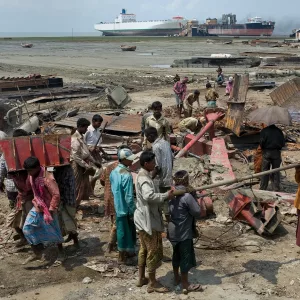 Credit The Guardian
Credit The Guardian
Applicability of Convention
The Convention describes a Ship as a vessel of any type whatsoever operating or having operated in the marine environment and includes submersibles, floating craft, floating platforms, self elevating platforms, Floating Storage Units (FSUs) and Floating Production Storage and Offloading Units , including a vessel stripped of equipment or being towed. The Convention does not apply to warships, naval auxiliary or other ships owned or operated by a Party and used, for the time being, only on government non-commercial service nor does it apply to ships of less than 500 GT or to ships operating throughout their life only in waters subject to the sovereignty or jurisdiction of the State whose flag the ship is entitled to fly.
Ship Recycling a Green Activity
“Ship Recycling” means the activity of complete or partial dismantling of a ship at a Ship Recycling Facility in order to recover components and materials for reprocessing and re-use, whilst taking care of hazardous and other materials, and includes associated operations such as storage and treatment of components and materials on site, but not their further processing or disposal in separate facilities for this end of life demolition segment.Ship recycling is also an activity which is completely green in terms of reprocessing
Ship Recycling Facility
“Ship Recycling Facility” means a defined area that is a site, yard or facility used for the recycling of ships. The Hong Kong Convention intends to address all the issues around ship recycling, including the fact that ships sold for scrapping may contain environmentally hazardous substances such as asbestos, heavy metals, hydrocarbons, ozone-depleting substances and others. It also addresses concerns raised about the working and environmental conditions at many of the world’s ship recycling locations and the establishment of an appropriate enforcement mechanism for ship recycling, incorporating certification and reporting requirements. Upon entry into force of the Hong Kong Convention, ships to be sent for recycling will be required to carry an inventory of hazardous materials, which will be specific to each ship and the country where the recycling has to take place will issue the required certification after stringent checking.
Accession
The Convention is open for accession by any State. It will enter into force 24 months after the date on which 15 States, representing 40 % of world merchant shipping by gross tonnage, have either signed it without reservation as to ratification, acceptance or approval or have deposited instruments of ratification, acceptance, approval or accession with the Secretary-General. Furthermore, the combined maximum annual ship recycling volume of those States must, during the preceding 10 years, constitute not less than 3 % of their combined merchant shipping tonnage.
Ratification
Sixteen countries have ratified the Hong Kong Convention including Belgium, Congo, Croatia, Denmark, Estonia, France, Germany, Ghana, India, Japan, Luxembourg, Malta, Netherlands, Norway, Panama, Portugal, Sao Tome and Principe, Serbia, Spain and Türkiye .The United States of America has not ratified the Convention. India has ratified the Hong Kong Convention. Of the approximate 45,000 ocean- going ships in the world about 800 are taken out of service every year.After Bangladesh accession to the Convention the minimum number of ratifying states required for the Convention’s global standards to become effective has been reached .The Convention will now become effective on 25th July 2025. In South Asia a ship recycling owner typically purchases a ship to be scrapped for around $ 4-10 million .The ship recycling yard owners take loan from local banks at high interest rates and the loan is repaid in six months time when the ship is completely scrapped. Pressure is now on larger flag states to ratify the Convention including at least one with large recycling capacity such as China. Bangladesh, China, India, Pakistan and Turkey are the world’s top five shipbreaking countries accounting for more than 98 % of global shipbreaking by gross tonnage. India is the world’s largest shipbreaking country and after its ratification the number of states required has now been reached.Approximately 10 % of the tonnage and 0.4 % of the recycling volumes need to be added before the Convention can enter into force. Bangladesh shipyards offer competitive prices and for container ships the purchasing band is $ 625 per l dt, tankers $ 605 and bulk carriers $ 575. Pakistan and India offer around $ 70 lower prices then Bangladesh. Türkiye which has ratified the Convention offers extremely low prices at $ 340, $ 330 and $320 for similar category of ships. Pakistan’s Gadani recycling shipyard , spread across a 10 km stretch, may soon turn into a veritable ghost town. Pakistan steel industry is heavily reliant on steel scrap obtained from Gadani ship breaking yards. Pakistan’s economy is beset by foreign currency availability and opening letters of credit for importing and purchasing ships for scrap is becoming increasingly difficult.
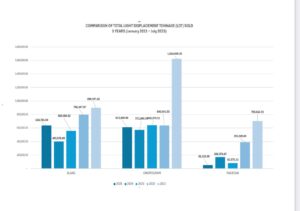 Credit;unkown
Credit;unkown
Demolition Market Price Worldwide Weekly Indicative Scrap
(29 August 2025)
Turkey
Wet – USD $ 255/265 per LDT
Dry – USD $ 245/255 per LDT
Container – USD $ 265/275 per LDT
Bangladesh
Wet – USD$ 420/430 per LDT
Dry – USD$ 400/410 per LDT
Container – USD$ 430/440 per LDT
Pakistan
Wet – USD$ 440/450 per LDT
Dry – USD$ 420/430 per LDT
Container – USD$ 450/460 per LDT
India
Wet – USD$ 430/440 per LDT
Dry – USD$ 410/420 per LDT
Container – USD$ 440/450 per LDT
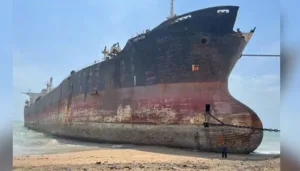 Credit;The News
Credit;The News
South Asian breakers like Pakistan, India, and Bangladesh which controlled about 70 % of the market until less than a decade ago have been severely impacted by a flood of cheap Chinese steel and new European Union environmental rules that have pushed business to more modern yards in places like China and Turkiye devastating local economies. The number of active ship breaking yards on Gadani beach Balochistan fell to 7 in the ongoing year 2025 year from a peak of over 130 in the year 2000 on its 10-kilometer long coastline according to the Pakistan Ship Breakers Association. The number of vessels beached also dropped to 7 from around 75 big ships in the year 2019. Business Insider shared that it took around 200 workers to break down an oil tanker of 85,000 DWT , who worked for almost 3 months , and 400 trucks transported the steel from this particular vessel to destinations in the country. Around one and half million tons of steel comprising 20 % of Pakistan’s entire steel demand used to come from Gadani ship recycling/ breaking yards . Generally workers are paid $ 4 per day on an average and working and also living conditions are unhygienic , appalling and unsafe and have no medical or life insurance. In a disastrous explosion at Gadani around 35 workers died and the compensation paid per worker was USD $ 7500 . Merely adopting of the Hong Kong Convention is insufficient till such time an independent and transparent enforcement mechanism is in place. Even the law and statute passed a year back is alleged to be partisan and in favour of the ship breaking owners and industry of Pakistan with little effective safeguards for the workers interests and well being.
The Patron Blue Economy News Nadir Mumtaz had an extensive discussion with Mr Ilyas Bawany , who has been in the business of selling vessels to the breakers in Pakistan . He informed that nowadays around 1-2 ships are beached monthly at Gaddani whereas previously 10-12 ships would come every month. Last 3 ships in Pakistan in 2025 have been 8000 LT vessels with a cost of approximately $ 4 million for each ship . He shared that the Hong Kong Convention would come into effect in July 2025 and lack of sufficient “ Green Yards “ in Pakistan would mean that ships would not come from USA or Europe. About 12 ship breaking yards are in the process of getting their ship breaking yards accredited as green yards . A “Green Yard “accreditation costs around half a million USD $. Pakistan has passed the required legislation however the regulatory agencies severely lack in capacity. An instance of negligence is the Degasification Certificate issued from last Port of Call which as per international standards is valid for 24 hours. The issuance price of a Degasification certificate is around $ 150,000 and the same certification and process can be performed at Gadani. This process would save precious foreign exchange if done in Pakistan at Gadani and generate employment for locals . On account of apparent disinterest at policy level vessels of European origin are destined for India and Bangladesh despite the fact that Gadani is a natural pasturing channel for ships to be beached. Indian and Bangladeshi beaches are almost a kilometer away and the breaking takes place in the marshy area which causes tragic accidents. Gadani has two tides which allows ship breaking in daylight and also allows immediate beaching which saves almost $ 10,000 daily demurrage costs payable in foreign currency. Customs and Sales tax per ton is around 17 % which makes Pakistan an unattractive market for scrap . On account of massive smuggling taking place along porous borders steel slabs are entering in 40 foot containers to meet the national demand. Legitimate Steel Mills are going in losses as they depended on Gadani Ship breaking industry which contributed huge amounts of tax. Regarding the approximate procurement price of a vessel for recycling Mr Ilyas Bawany informed that the price of a bulk carrier is PKR 435 million , tanker PKR 445 million depending on size / tonnage ranging from 6,000 LdT, 12,000 LdT to 8000 Ldt which cost around 8000* 435•283 = PKR 985,000,000 approximately . Cruise and container ships do not come to Pakistan for recycling and shipyard owners prefer bulk carrier , as with vessels such as tankers too much regulation is involved and time delays take place in acquiring cutting permission. The LNG and LPG vessels in today’s market are going for USD $ 580/600 LDT as compared to prices quoted aboveMr Ilyas Bawany shared that LDT , which is the light weight of vessel , and vessels for scrap are sold on LIGHt weight , actual weight of vessel (steel) excluding liquids etc . The LDT is worked out at the time of manufacture , addition and removal noted and LDT or light weight is shown in the trim and stability booklet of the vessel . Demolition rates in Turkey are lower as it breaks vessels in shipyards and not on the beaches and breaking yards like Pakistan as it would be akin to bringing a vessel into shipyard at Karachi and dry dock and break with costing goes crazy . Only a few special vessels go to Turkey for demolition. India presently pays highest for scrap and demolition as steel scrap and other non ferrous material are quoted at high rates in India . What one tends to forget or overlook is that the daylight smuggling of steel from across the Iranian border and cheaper import of steel from China , whether state subsidised dumping , is making ship recycling non profitable .
Hazardous Industry
Impact of Hong Kong Convention on Yards of Southeast Asia
HKC Comes into Force
Under the HKC vessels to be sent for recycling are required to carry an inventory of hazardous materials, specific to each ship. An appendix to the HK Convention contains a list of hazardous materials, the installation or use of which is prohibited or restricted in shipyards, ship repair yards and ships of Parties to the HK Convention. Ships will be required to have an initial survey to verify the inventory of hazardous materials, renewal surveys during the life of the ship and a final survey prior to recycling. Ship recycling yards will be required to provide a Ship Recycling Plan, to specify the manner in which each individual ship will be recycled, depending on its particulars and its inventory. Parties will be required to take effective measures to ensure that ship recycling facilities under their jurisdiction comply with the Convention.
Persistent organic pollutants like Mercury
Persistent organic pollutants (POPs) including polycyclic aromatic hydrocarbons represent a prominent global environmental challenge owing to their inherent toxicity and remarkable capacity to endure in the environment over prolonged durations and no studies have been conducted in Gadani. The gadani shipbreaking yard like most in South Asia operate on a tidal beach causing pollution to both soil and water. The area is void of hazardous waste disposal facilities and toxins are conveniently dumped in the sea .The majority of the vessels broken down in Gadani are oil tankers or floating storage and rarely a passenger ship or a cargo ship beaches at Gadani (except in the pandemic). Importation of older ships is undesirable as they are more likely to contain banned substances . Floating Storage and Offloading (FSO) tanker J. NAT was beached at Gadani , being illegally exported from Indonesia , and multiple attempts made to illegally scrap it in South Asia. In Bangladesh local authorities banned its entry due to the dangerous presence of hazardous substances in its steel structures, ballast waters, oil slops and oil sludges following alerts by INTERPOL . In an attempt to conceal the ship’s identity, its name was changed several times, from J. NAT to RADIANT to CHERISH and its real-time location concealed. After several months off the radar the vessel was beached at Gadani resulting in an international toxic pollution scandal as tests carried out in Indonesia showed that mercury contamination in the sludge of this ship was about 395 milligrammes/ kilogramme .In Gadani the mercury vanished giving rise to speculation that either the sludge was dumped into the sea or it was disposed of illegally in Pakistan. At times holes are bored into the hull of the ship to pump out the sludge into the sea and the oil flows in the daytime being warm and solidifies at night. A 26-acre land is designated by Balochistan Development Authority for a landfill site for hazardous waste management in Gadani area however the site is not established apparently due to a lack of funding .
Scandal at Turkish Ship Recycling Yards
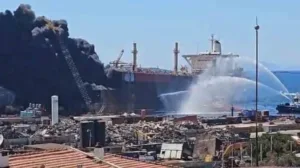 Credit;Maritime Executive
Credit;Maritime Executive
The Maritime Executive shared that a supertanker, deployed as a storage platform off Libya(Named Sloug –251,500 dwt) was at a Turkish yard being dismantled when fire broke out. The tanker was built in Italy in 1973 and in 1989 was converted for floating storage off Libya . Turkish interests reportedly acquired the vessel for dismantling and when it arrived in Egypt environmental protests erupted and the ship was rerouted toTurkey in 2023 . Environmentalists claim the ship had been used to store waste containing as much as 6,000 tons of chemical waste still aboard and the tanks had not been vented, and there could be a buildup of dangerous vapors.
Since decades the ship recycling industry has been considered as an industry associated with pollution and dangerous conditions for the workers that depend on ship recycling for livelihood. The HK Convention for the Safe and Environmentally Sound Recycling of Ships has entered into force on 1st of July , 2025 . The HKC sets global standards for how end-of-life ships must be dismantled, and its scope extends beyond environmental considerations. The convention includes worker safety an area not addressed by the Basel Convention (BC) and acknowledges the continuous ownership of vessels throughout their lifecycle. Its entering into force represents the transformation of an industry that is facing its greatest tests and at the same time greatest opportunities in the history of ship recycling. The recycling industry may have a reprieve of two years allowing states that are party to the BC to navigate around the co-existence of the two conventions despite the fact that the debate at Basel COP has been dominated by representatives of states that may possess expertise on waste but none of shipping.
The current estimates of the potential is 16,000 ships, or 700m deadweight tonnes (DWT) nearly triple the DWT recycled over the last decade and highlights the need for investments in compliant recycling facilities. Around 115 out of India’s 130 recycling yards are HKC compliant after having undergone extensive upgrades and investment and they strongly advocate that with the HK convention in force compliant yards must not be ignored on EU destinations .
Balochistan Development Authority Initiative
As per Balochistan Development Authority (BDA) nine (09) shipyards at Gadani have completed 90 % of the physical and procedural requirements and compliance measures in line with HKC . Several of these yards have initiated desktop audits through internationally recognised classification agencies such as Bureau Veritas and full compliance is expected by end of 2025. As an interim measure BDA is issuing “Interim Documents of Authorisation to Conduct Ship Recycling” (DASR) to meet key operational criteria and to operate under regulated conditions until formal HKC compliance certificate is issued. A federally approved project titled “Modernisation and Upgradation of Gadani Shipbreaking and Recycling Industry and development of allied Facilities “ which includes a key component of “Establishment of a Storage and Disposal Facility “ at Gaddani to handle hazardous waste such as asbestos , heavy metals and PCB’s in accordance with Basel Convention and HKC Convention .In the meantime the ship recyclers are using a privately run Storage and Disposal Facility at Karachi. The Balochistan Safe and Environmentally Sound Ships Recycling Bill 2025 has been approved by the Cabinet and will be enforced shortly along with issuance of updated rules to comply with HKC requirements.
ILO
Technical workshops and capacity building are being conducted under the aegis of UNIDO and ILO. A project has been launched by ILO for the period 4th November 2024 till 31st December 2026, and the development partners include International Maritime Organization through the Norwegian Ministry of Foreign Affairs , Maritime Organization (IMO), Ministry of Overseas Pakistanis and Human Resource Development (MoPHRD), Ministry of Maritime Affairs (MoMA) and Ministry of Climate Change (MoCC), Balochistan Development Authority (BDA), Department of Labour and Human Resources Balochistan, Pakistan Ship Breakers and Recyclers Association (PSBA), Employers and Workers Organisations.
New Entrants in Green Ship Recycling
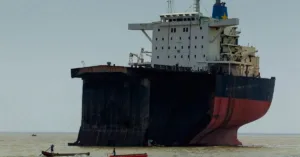 Credit;MarineInsight
Credit;MarineInsight
Oman plans to establish the first fully integrated green ship recycling facility in the Gulf to enable it to achieve its 2050 net-zero emissions goal and support sustainable shipping. The recycling facility will have the capacity to dismantle and recycle over 70 ships each year and during its initial phase, it is expected to produce around 2 million tonnes of high-quality, low-carbon steel annually to be supplied to Oman’s iron and steel industries thereby contributing to the country’s non-oil GDP growth and supporting the circular economy. Global ship recycling is expected to more than double in the next ten years, with approximately 16,000 ships, or 700 million deadweight tonnes (DWT), estimated to be dismantled globally based on recycling patterns between 2000 and 2019 and applying average recycling rates by vessel type and age. Such estimates are based on 10 % of 20-year-old capesize bulk carriers being dismantled during that period and the same pattern may be repeated over the next decade. Ships built in the 2000’s are likely to dominate scrapping activity and in the period 2015–2024, vessels constructed in the 1990s made up 35% of scrapped ships and 62% of DWT recycled. Bulk carriers, tankers and container ships will constitute the majority of scrapped tonnage, around 91 % . In the period 2015 to 2024, most ship recycling was handled in South Asia with Bangladesh, India and Pakistan handling 86% of recycled DWT pursuant to China exiting international ship recycling in 2017 and now China recycles less than 2 % of global DWT. Leaving aside South Asia, Turkey specialises in dismantling offshore vessels , thus South Asia is likely to remain the primary hub. The previous record for ship recycling occurred in 2012, with about 1,800 ships and 60 million DWT dismantled. While Pakistan will face stiff competition from Oman , Germany is surprisingly intervening in the South Asian industry . German maritime experts are concerned that transporting vessels , including coastal and inland waterway ships, over long distances to Pakistan for demolition, may result in environmental disasters when old and obsolete vessels shipped for dismantling, ultimately rot and ruin the environment and damage the health of local communities.
Author Nadir Mumtaz
Trademark Blue Economy – IPO
Co-author Hafiz Munawar Iqbal
Advocate Supreme Court of Pakistan,
Advisor Maritime Law
Credit ;
https://www.bimco.org/news-insights/bimco-news/2025/06/25-hkc/
https://www.sciencedirect.com/science/article/pii/S016041202400117X
https://doi.org/10.1016/j.envint.2024.108531
https://eeb.org/pakistani-workers-poisoned-during-scrapping-of-infamous-mercury-laden-tanker/
https://law.balochistan.gov.pk/
https://www.go-shipping.net/demolition-market
https://www.marineinsight.com/shipping-news/germany-gets-its-first-green-ship-recycling-facility/


Leave A Comment